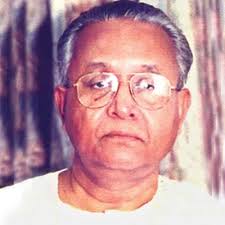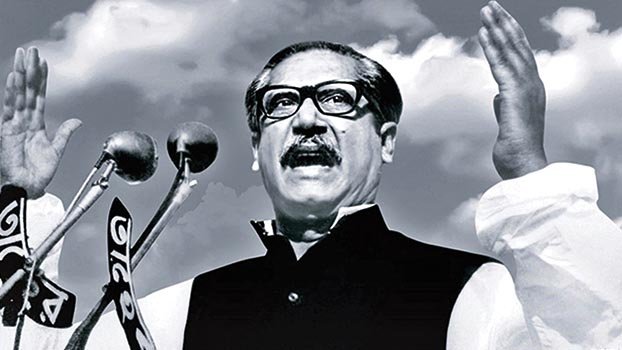7th March speech and our independence

The 7th March speech of Bangabandhu Sheikh Mujibur Rahman at Suhrawardy Udyan in 1971, addressing at least 10 lac people of the then East Pakistan has been acclaimed by many as one of the best speeches of the globe many years after it was delivered. One should not call it a mere speech, rather it was all about the directives that Bangabandhu gave to his people prior to their engagement in the war of liberation.
Although in that speech he did not categorically declare independence, it was none the less starter than that. As he said, “Ebarer Sangram Amader Muktir Sangram, Ebarer Sangram Swadhinatar Sangram,” which was obviously clear what he exactly meant to say by that speech. It was after a long struggle for regional autonomy that he launched non-cooperation movement on 3 March and declared struggle for independence in that speech on 7 March.
In reality when the Pakistan government deferred the sitting of the national parliament called on 3 March following the landslide victory of 1970 election. Sheikh Mujib really felt the need to tell his people what to do then. And it was expected by all that Sheikh Mujib was going to declare Independence of Bangladesh in that meeting. Being political leader of outstanding sagacity he did not directly declare the independence but he left no scope that could make the declaration of independence a bit hurry. He finally talked by the grace of the Almighty that he would liberate his country this time.
But he did not create any opportunity for his rival so that they could tell him a secessionist and kill his people in thousands on the very declaration of independence. He narrated the history of the subjugation of his people by the Pak rulers and told that if parliament was not allowed to be held on 3 March, how the rules had been prepared and told his people that there duty forthwith.
He told them with what little they had in terms of weapon and the people got really with them civil guns and indigenous weapon – teer dhanuk (arrow and bow), gulti (catapult) and spear. In fact it was after his address to the people on 7 March that the people came out from their house on the street with all out protesting and started confrontation with army. The war began on 25 March. The occupation army did scathing attack on the innocent unarmed Bangalees killing thousands on the very fateful night of March 25.
The 7 March speech dealt with almost all issues alive then. But the most important was the directives given by Bangabandhu for running the civil government ignoring the government of Pakistan. In fact from 3rd of March to 26th, the people of Bangladesh listened to the orders of Sheikh Mujib and not the autocratic ruler of Pakistan. There was no flag of Pakistan anywhere in Bangladesh excepting the cantonment where the occupation armies had been staying. A Pakistani leader Aga Khan who visited Bangladesh at that time said that none could save Pakistan other than Sheikh Mujib.
The situation was so grave then. In reality it was in that speech Sheikh Mujib told his people how to conduct a guerilla war against the occupation army and ordered to lay seize of the occupation army. He spoke of such a seizure that the supply of food and water cuts off. He ordered disruption of road communications and what not. In fact he was de facto head of the government.
As the people voted him to power he did exercise it even when his government was not in existence. He was an extraordinary leader who ruled his country even before its birth. Only Sheikh Mujib could do it as an absolute leader of his people. From 3 to 26 March, Sheikh Mujib’s directives were the laws of the land. The central government of Pakistan had no control over the East Pakistan. In fact Sheikh Mujib was the head of the government. If we think in terms of democracy it was unparallel in history that a democratic leader having an absolute support of the ballot could rule on the mandate of his people.
In fact the non-cooperation movement of 1971 was not a type that Mahatma Gandhi did launch against the British rule rather it was complete revolt against the central government of Pakistan ignoring it totally and having a different ruling authority for people. Sheikh Mujib has shown to the world of democracy how the voting rights of the people could be utilized as weapon against a dictator.
In reality the 7 March Speech was really the declaration of independence of Bangladesh, although Bangabandhu had to declare independence on the 26 early hours immediately after the attack “Operation Search Light” launched by the occupation army.
It was a speech that inspired the freedom- loving people of Bangladesh to engage in armed struggle against the occupation army. The aim of the struggle was to emancipate the people and to earn independence. The 23 years struggle against economic disparity between the two wings and the demand for autonomy is over. The time was then ripe to free the country from the sub colonial rule by the Pakistani military Junta.
The conspiracy of the central government of Pakistan and the military Junta not to transfer power to the elected parliament and to defer the session for unlimited period of time was nothing but a trick to prepare for an all-out war against Bangladesh. So he told the outside world that Pakistan did lose the right to govern East Pakistan as the people of the East voted them out.
Out of 169 seats of the national parliament reserved for East Pakistan, the Awami League led by Sheikh Mujib did obtain 167, proving that Sheikh Mujib is the only leader and the six-point program is the Magna Carta of the people of the East. In fact people did make Sheikh Mujib as their only spokesperson. None could challenge his governing authority. He was the leader, he was the government and the people expressed solidarity behind him. The 7th March speech did really determine the fate of Pakistan and Bangladesh as well.
Pakistan felt that Bangladesh under the leadership of Sheik Mujib was an independent state. There could be no negation with Sheikh Mujib as he is not willing to budge an inch in respect of his six points and Pakistan could never abide by the decision of Sheikh Mujib. So the war was the solution and they resorted to it on 25 March. The war continued for nine months. The Pakistani occupation armies were compelled to surrender by Bangladesh and Indian joint command. Bangladesh got free.
A nation of 7.5 million Bangalees raised their head high on 16 December 1971 when occupation armies did surrender after 23 years of exploitation of the Bangalees and Bangladesh emerged as an independent country in the world. Sheikh Mujib who was in Pakistan jail got released and came back to independent Bangladesh on 10 January 1972 and took the charge of governance of the country created at the sacrifice of 3 million Bangalees.
Dr S A Malek is former political adviser to the Prime Minister and Member of Parliament, general secretary of Bangabandhu Parishad and a columnist



